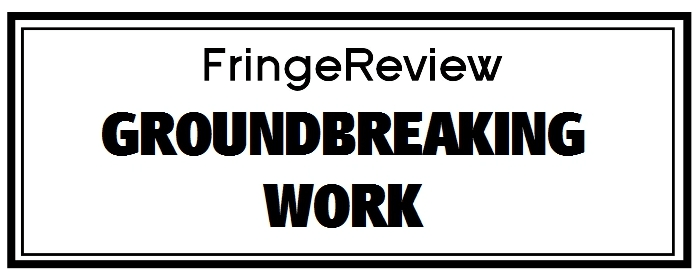FringeReview UK 2021
What If If Only
Royal Court Theatre

Genre: Contemporary, Drama, Mainstream Theatre, New Writing, Short Plays, Theatre
Venue: Royal Court Jerwood Downstairs
Festival: FringeReview UK
Low Down
Directed by James Macdonald (Assistant Director Grace Duggan) and designed by Miriam Beuther with Prema Mehta’s lighting and Christopher Shutt’s sound design. Stage Manager Heather Cryan, DSM Fran O’Donnell, Costume Supervisor Jackie Orton, Chaperone Victoria Reynoldi-King. Set built by Ridiculous Solutions, Video Content Isaac Madge. Till October 23rd.
Review
There’s an incomparable playfulness that runs right through grief, tragedy and apocalypse in Caryl Churchill. It’s as if by laughing at dead futures so hard you might just prevent a few.
Being Churchill she’s seized on that implicit strand and turned it into a whole 22-minute play (billed as 17): What If If Only premiered at the Royal Court.
Oh and a ghost of the future turns up, then Child Future. Someone’s beaten me to that joke, but you know what the Dickens Churchill’s up to. She shows you the glass bottom of your assurances, then springs a leak.
Older writers still seething with ideas accelerate condensed forms, a shorthand against oblivion. Churchill’s language is growing more litanic too, close to poetry and that’s why you won’t feel short-changed: the text bears re-reading. Air, published alongside What If, really does read like late Ashbery dashed with late punning Geoffrey Hill.
Naturally there’s Beckett and Pinter but Churchill’s different. Though she still writes longer plays like 2015’s Escaped Alone (also featuring Linda Bassett, as here) she’s written shorts from the start; and increasingly her longer works like 2019’s Glass. Kill. Bluebeard. Imp. deploy discrete scenes as the title suggests. Imp’s longer than all the rest as well as this work.
If Imp’s an endless glinting facet, then What If If Only is unique in tackling grief, in John Heffernan’s wrenching portrayal as ‘Someone’ who’s lost his partner quite young. He sits at a table in an antiseptic white box designed by Miriam Beuthner, with a glass of wine, a wedding ring still on, an empty chair. It’s like an antechamber to the next world. Funny that.
Loss is implicit in his fractured imaginarium, the wild displacement of painting an apple exactly like an apple, which elicits laughter (Bramley… an orange?) till his body-doubling outburst ‘I miss you’ over and over. There’s nothing quite like this in Churchill. Bassett repeats ‘terrible rage’ at the end of Escaped Alone more, but that’s wry, seething, a conclusion with a playful twist. Here, it’s the unresolved arc of hope and outfall.
Bassett naturally turns up as Future. There’s laughs Churchill’s written for her: ‘’I solidified just enough look you can’t see through me can you, I’m… almost here’ but comes to it with: ‘Make me happen’. Future offers in her avatar none of the past that involves the death of Someone’s partner need happen (not ‘have happened’).
Director James Macdonald’s made some simplifying choices since all the crowding Futures that pop up can easily be imagined and Bassett morphs from Future to Present, making her a paradoxically see-though chameleon, less likely to be clanking a ball and chain, more liminal and convincing.
Future goads Someone with his partner’s ‘very ghastly not a pretty way to go’ which begs questions of recent events. It’s also clear in Future’s language, that stabbing word ‘utopia’ or even ‘Equality and cake’ and more seriously ‘I’ve been died for in China and Russia and South America.’
It underscores a clear subtext of far better worlds, not all of them lost in the winning; one socialist Churchill has interrogated all her career. Future’s ‘You’re the one living, you’re the one can make things happen’ naturally flummoxes Someone, who can hardly wrench the hands of every recent clockface of politics and history, gene-editing and social provision.
Doubtless a full cast would make a spectacle. The imaginary Futures crowd in like hungry ghosts ‘No no no… the others are hungry’ Future pleads but it’s too late and Someone ends up with Futures speaking then Present (blink and you miss Bassett’s morphs). ‘No they didn’t happen. All gone… Do you like me? I’m not very nice not altogether. So many people sick and dead and crazy from what I’m like’ and we’re back` in the crushed world which Present outlines in her repeated ‘Hello’.
There’s a small rupture though as Jasmine Nyenya’s Child Future rolls up from under the back wall with ‘I’m going to happen’ and there’s a surprising lift as the others take this in. Nyenya’s alert, pert ball of energy bounces round like a free electron at a neutron party. It’s a sliver of yes, of a Future that gets away perhaps.
Production’s as clean and bright as all recent Court Churchill productions. Alongside Macdonald and Beuther Prema Mehta’s steady lighting and Christopher Shutt’s sound design – some curiously Chekhovian noises off like a rumbling train being uppermost – allow that liminal spookiness some nimbus.
Churchill’s anatomy of grief though is what abides, literally being beside oneself, taken here to a metaphysical dramaturgy filleted with wit and glinting worlds away from it. Churchill’s famously protean and never repeats herself. If formally What If If Only bears kinship to her recent output, its emotional plangency and pulling the future open is unique.
It fits the Royal Court season too. Being so short it plays at 6pm and 10pm whilst in between the superb 90-minute revenger’s comi-tragedy Is God Is by Aleshea Harris, about to alternate too with Lucy Kirkwood’s Maryland, a script-in-hand performance next week which landed unannounced in Artistic Director Vicky Featherstone’s inbox barely a week ago. It too deals with violence against women. The urgency of grief, terror, ways to fight back are literally re-shaping the Court’s season. Uniquely too the Court embraces it like no other theatre.

































